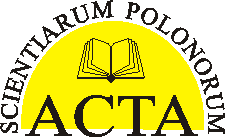Title
EFFECTS OF FOLIAR OF THE APPLICATION CHITOSAN AND REDUCED IRRIGATION ON ESSENTIAL OIL YIELD, TOTAL PHENOL CONTENT AND ANTIOXIDANT ACTIVITY OF EXTRACTS FROM GREEN AND PURPLE BASIL
Autor
Behzad Hamedi, Ahmadreza Golparvar, Azam Salimi, Fatemeh Malekpoor, Abdollah Ghasemi Pirbalouti
Keywords
chitosan, Ocimum basilicum, water deficit stress, total phenolic compounds
Abstract
Phenolic compounds are naturally occurring substances in plants. Basil (Ocimum basilicum L.) belongs to the family Lamiaceae, is a good source of phenolic compounds and natural antioxidants. Elicitors can activate specific genes involved in secondary metabolite biosynthesis. Chitosan, as elicitor, is a natural biopolymer modified from chitin, which is the main structural component of squid pens, cell walls of some fungi and shrimp and crab shells. On the other hand, water deficit stress is one of the most abiotic stress, which effects on the levels of secondary metabolites. To evaluate the effect of chitosan and different irrigation regimes on essential oil yield, total phenol content and antioxidant activity of extracts from green and purple basil (Ocimum basilicum L.), an experiment was conducted at Shahrekord, southwestern Iran. Treatments comprised control, 0.0, 0.2, and 0.4 g· L–1 chitosan applied to plants under normal irrigation, slight and mild drought stress conditions. Results indicated that the different levels of chitosan and irrigation had significant effects on the essential oil yield, total phenol content, and the antioxidant activity of the extracts. Foliar-applied chitosan in particular 0.4 g· L–1 increased total phenolic content in the basil as compared to untreated plants. In conclusion, it is suggested that the foliar application of chitosan as an elicitor could be a promising material used to increase biological activity and pro-health functional value of basil plants.
Pages
177-186
Cite
Hamedi, B., Golparvar, A., Salimi, A., Malekpoor, F., Pirbalouti, A. (2017). EFFECTS OF FOLIAR OF THE APPLICATION CHITOSAN AND REDUCED IRRIGATION ON ESSENTIAL OIL YIELD, TOTAL PHENOL CONTENT AND ANTIOXIDANT ACTIVITY OF EXTRACTS FROM GREEN AND PURPLE BASIL. Acta Sci. Pol. Hortorum Cultus, 16(6), 177-186.
Full text


